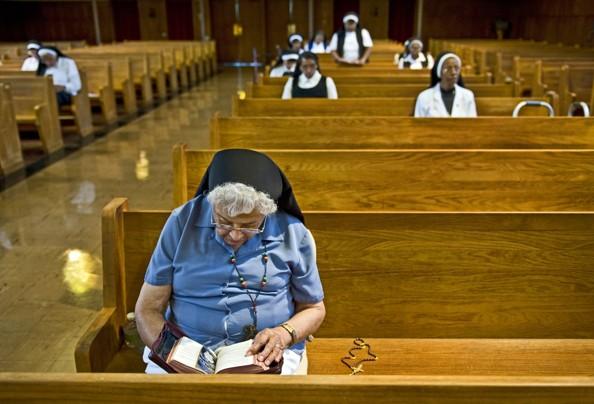American Nuns Stunned by Vatican Accusation of 'Radical Feminism,' Crackdown
By Michelle Boorstein and Elizabeth Tenety
[with video] American nuns struggled to respond Friday to a Vatican crackdown on what it calls "radical feminism" among the women and their purported failure to sufficiently condemn such issues as abortion and same-sex marriage. Some nuns in the Leadership Conference of Women Religious characterized the disciplinary action announced Wednesday as an "ambush," but others — including the leadership — said they couldn't publicly comment on a system that mandates their obedience. The 1,500-member conference represents the vast majority of the country's 57,000 nuns. "People are stunned," said Sister Pat McDermott, president of the 3,500-member Sisters of Mercy of the Americas, based in Silver Spring. "They're outraged, angry, frustrated, they don't know where this came from and how to hold it." Thousands of people joined a Twitter drive to support the Leadership Conference, which represents more than 80 percent of American nuns. Using the hashtag #whatsistersmeantome, one person wrote of the nun who "was the rock of our Catholic campus." Another man tweeted about how his father lost his own mother at 13. "It was the Mercy sisters who consoled and loved him onward." The conflict highlighted the deep divisions among American Catholics about such issues as sexuality and the male-only priesthood, as well as about how much church leaders should focus on clarifying Catholic doctrine and how much on caring for the poor. While experts said nuns generally have focused more on such issues as poverty and health care — and less on doctrine — they are not homogenous. Traditional, habit-wearing nun groups are growing more than less traditional orders these days, and reaction to the Vatican move among nuns was "all over the map," said Mary Gautier, a researcher with the Center for Applied Research in the Apostolate at Georgetown University, a Catholic school. The Vatican report took the nuns to task for making "occasional public statements" that disagree with the bishops, "who are the church's authentic teachers of faith and morals." The group condemned by the Vatican represents a wide range of prominent nuns, also called women religious, from Sister Carol Keehan, the head of the Catholic Health Association, which runs 2,000 hospitals and other health facilities, to Sister Mary Ann Walsh, the spokeswoman for the U.S. Conference of Catholic Bishops, which is to implement the Vatican action. They both declined to comment. Seattle Archbishop Peter Sartain has been assigned to oversee a "reform" of the Leadership Conference, which may involve changing the group's statutes and who speaks at events. Tensions have publicly flared recently between the bishops and the leadership conference — along with a few other large prominent nun-led groups — over public-policy issues. Some bishops were angry when the leadership conference supported the White House's health-care reform, which the bishops' conference had vigorously opposed. The bishops also have focused on opposing a White House mandate that employers, including religious ones, offer birth control, while the nuns accepted a compromise from President Obama. The Vatican report didn't focus on public positions the women took but rather on the private conversations they had at their own meetings and comments they made in private letters to Vatican officials about such issues as how to minister to gays and lesbians. Some experts said the conflict embodies the gender dynamics of a male-led church. "Women can't be bishops, so there's a very strange question of whether we can ever voice a response that challenges" the Vatican, said Jeannine Fletcher, a theologian who focuses on gender at Fordham University, a Jesuit school. "If women religious can't, no women can." Sister Julie Vieira, a member of the Michigan-based Sisters, Servants of the Immaculate Heart of Mary, said the fact that the directive came without warning was jarring. "Whatever we engage with in ministry . . . we check in with others about it, and together as a sisterhood we make decisions," she said. "To encounter this kind of action that did not come with that contemplative discernment that I, as a woman religious, am used to engaging with in all of my life was deeply disturbing to me." However, she said, "our vow of obedience applies to God . . . it doesn't reside in a bishop, a body of bishops or even the pope. For us, that sense of obedience has to do with listening deeply to the call of the spirit." McDermott said the connection between priests and nuns has been weakening. In the late 1960s and early 1970s, she said, "the mutuality and respect was extraordinary, feeling we were all in this together." Today, she said, different approaches to a changing society and the role of the church means "that sense of hospitality, many of us would say, is growing dimmer." Sister Annemarie Sanders, spokeswoman for the Leadership Conference, said the nuns have already faced the challenge of a shrinking population in recent decades. "We know it's becoming a smaller entity of women and probably is not going to be called to serve the world in the same ways that we were in the past," she said.
|
.
Any original material on these pages is copyright © BishopAccountability.org 2004. Reproduce freely with attribution.
